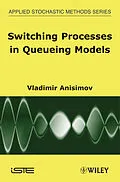Switching processes, invented by the author in 1977, is the main tool used in the investigation of traffic problems from automotive to telecommunications. The title provides a new approach to low traffic problems based on the analysis of flows of rare events and queuing models. In the case of fast switching, averaging principle and diffusion approximation results are proved and applied to the investigation of transient phenomena for wide classes of overloading queuing networks. The book is devoted to developing the asymptotic theory for the class of switching queuing models which covers models in a Markov or semi-Markov environment, models under the influence of flows of external or internal perturbations, unreliable and hierarchic networks, etc.
Autorentext
Vladimir V. Anisimov is currently Director of the Research Statistics Unit at GlaxoSmithKline, UK. He has written about 200 papers, nine books and manuals in this area.
Inhalt
Preface 13
Definitions 17
Chapter 1. Switching Stochastic Models 19
1.1. Random processes with discrete component 19
1.1.1.Markov and semi-Markov processes 21
1.1.2. Processes with independent increments and Markov switching 21
1.1.3. Processes with independent increments and semi-Markov switching 23
1.2. Switching processes 24
1.2.1. Definition of switching processes 24
1.2.2. Recurrent processes of semi-Markov type (simple case) 26
1.2.3.RPSMwithMarkov switching 26
1.2.4. General case of RPSM 27
1.2.5. Processes with Markov or semi-Markov switching 27
1.3. Switching stochastic models 28
1.3.1. Sums of random variables 29
1.3.2. Random movements 29
1.3.3. Dynamic systems in a random environment 30
1.3.4. Stochastic differential equations in a random environment 30
1.3.5. Branching processes 31
1.3.6. State-dependent flows 32
1.3.7. Two-level Markov systems with feedback 32
1.4. Bibliography 33
Chapter 2. Switching Queueing Models 37
2.1. Introduction 37
2.2. Queueing systems 38
2.2.1. Markov queueing models 38
2.2.1.1. A state-dependent system MQ/MQ/1/ 39
2.2.1.2. Queueing system MM,Q/MM,Q/1/m 40
2.2.1.3. System MQ,B/MQ,B/1/ 41
2.2.2.Non-Markov systems 42
2.2.2.1. Semi-Markov system SM/MSM,Q/1 42
2.2.2.2. System MSM,Q/MSM,Q/1/ 43
2.2.2.3. System MSM,Q/MSM,Q/1/V 44
2.2.3. Models with dependent arrival flows 45
2.2.4. Polling systems 46
2.2.5. Retrial queueing systems 47
2.3. Queueing networks 48
2.3.1. Markov state-dependent networks 49
2.3.1.1. Markov network (MQ/MQ/m/)r 49
2.3.1.2. Markov networks (MQ,B/MQ,B/m/)r with batches 50
2.3.2.Non-Markov networks 50
2.3.2.1. State-dependent semi-Markov networks 50
2.3.2.2. Semi-Markov networks with random batches 52
2.3.2.3. Networks with state-dependent input 53
2.4.Bibliography 54
Chapter 3. Processes of Sums of Weakly-dependent Variables 57
3.1. Limit theorems for processes of sums of conditionally independent random variables 57
3.2. Limit theorems for sums with Markov switching 65
3.2.1. Flows of rare events 67
3.2.1.1. Discrete time 67
3.2.1.2. Continuous time 69
3.3. Quasi-ergodic Markov processes 70
3.4. Limit theorems for non-homogenous Markov processes 73
3.4.1. Convergence to Gaussian processes 74
3.4.2. Convergence to processes with independent increments 78
3.5. Bibliography 81
Chapter 4. Averaging Principle and Diffusion Approximation for Switching Processes 83
4.1. Introduction 83
4.2. Averaging principle for switching recurrent sequences 84
4.3. Averaging principle and diffusion approximation for RPSMs 88
4.4. Averaging principle and diffusion approximation for recurrent processes of semi-Markov type (Markov case) 95
4.4.1. Averaging principle and diffusion approximation for SMP 105
4.5. Averaging principle for RPSM with feedback 106
4.6. Averaging principle and diffusion approximation for switching processes 108
4.6.1. Averaging principle and diffusion approximation for processes with semi-Markov switching 112
4.7. Bibliography 113
Chapter 5. Averaging and Diffusion Approximation in Overloaded Switching Queueing Systems and Networks 117
5.1. Introduction 117
5.2. Markov queueing models 120
5.2.1. System MQ,B/MQ,B/1/ 121
5.2.2. System MQ/MQ/1/ 124
5.2.3. Analysis of the waiting time 129
5.2.4. An output process 131
5.2.5. Time-dependent system MQ,t/MQ,t/1/ 132
5.2.6. Asystemwith impatient calls 134
5.3. Non-Markov queueing models 135
5.3.1. System GI/MQ/1/ 135
5...
